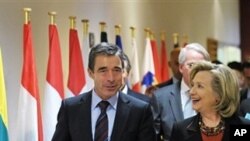A month before a key summit, NATO's secretary-general has called on the alliance to adopt new responses to modern-day threats.
In opening remarks at the one-day conference in Brussels, NATO Secretary-General Anders Fogh Rasmussen said it is critical that the transatlantic alliance "get it right" as it drafts a new blueprint for the future.
"NATO's core mission, to protect the 900 million civilians of NATO countries from attack, must never change," Rasmussen said. "But it must be modern defense against modern threats."
Rasmussen was addressing a highly unusual joint meeting of foreign and defense ministers of the 28-member alliance. At issue: carving out what NATO terms its new "strategic concept," or mission statement to deal with an array of new threats, including ballistic missiles, cyber warfare and terrorism.
Heads of state are expected to adopt this new document, during a NATO summit next month in Lisbon. It will replace the last strategic concept, drafted in 1999 - before the terrorist attacks in the United States, Britain and Spain and the wars in Iraq and Afghanistan.
Rasmussen is pushing for NATO to embrace missile defense in Europe.
"The threat is clear, the capability exists and the costs are manageable," Rasmussen said.
The revamped NATO is expected to be slimmer, in line with current austerity measures, including expected defense budget cuts by some member states.
Nick Witney is a defense analyst at the European Council on Foreign Relations in London. He says the only element of potential controversy is the call for a nuclear-free Europe.
"The German foreign minister, in particular, has been quite vocal on calling for the removal of NATO's nuclear weapons from Europe and that is something some of the alliance's heavyweights are going to resist," Witney said.
The war in Afghanistan is not on the Brussels agenda, but NATO heads of state will likely discuss it in Lisbon. The conflict is now entering its 10th year.
NATO Chief Urges New Response to Modern-Day Threats
